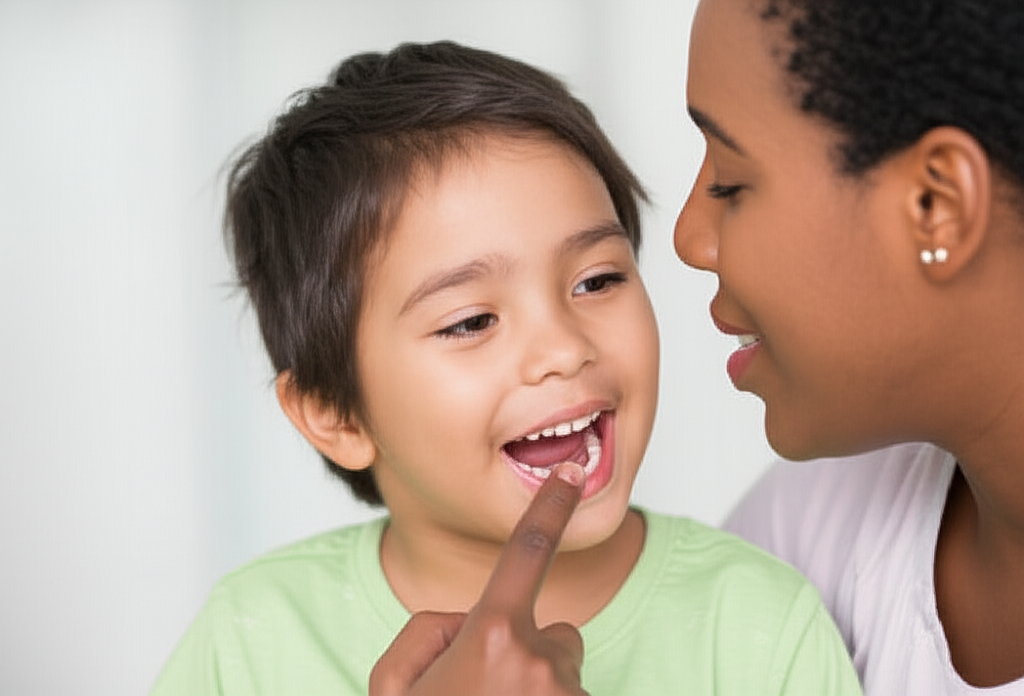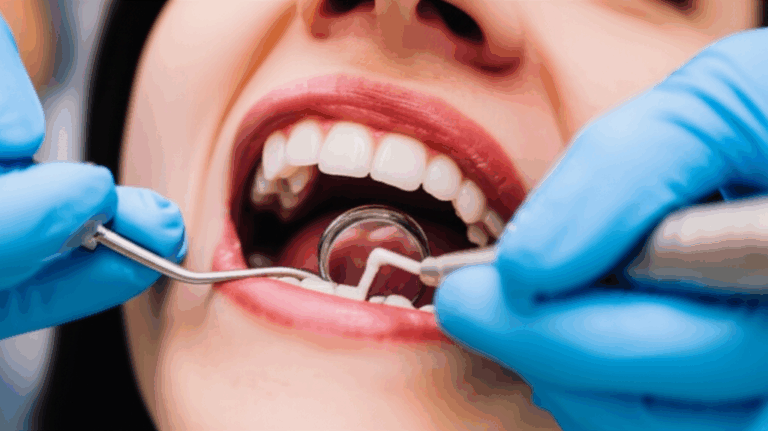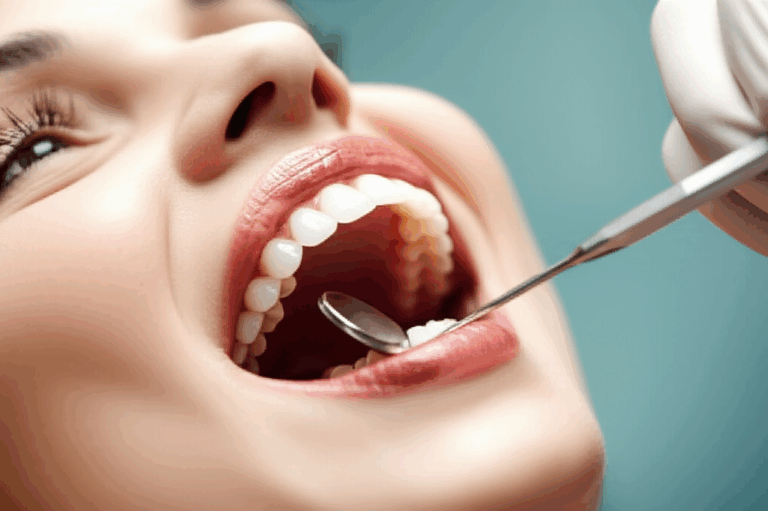
When Should a Child Go to the Dentist? Your Essential Guide to First Dental Visits & Beyond
Table of Contents
The Golden Rule: “First Tooth, First Visit” (or Age One)
I remember the first time I heard about taking a baby to the dentist. My first thought? A baby with barely any teeth—why go so early? But after learning more (and getting great advice from people like Dr. Joe Dental), it made sense.
Why Age One? (Or First Tooth)
Let me explain why experts say you should take your baby to the dentist by the time they turn one or get their first tooth.
- Setting up a “Dental Home”: Like finding a good family doctor, seeing a dentist early helps your child get used to the visits and builds trust.
- Finding Problems Early: Having the dentist check early helps find problems, like early tooth decay, before they get worse (and painful).
- Teaching Parents: That first appointment is for you, too. The dentist will show you how to clean baby’s teeth, when to start flossing, and which habits to avoid.
- Stopping Problems Before They Start: Doing a little work now helps prevent bigger problems later. Starting dentist visits early helps your child learn good habits right from the start.
Official Recommendations
Both the American Academy of Pediatric Dentistry (AAPD) and the American Dental Association (ADA) say:
The first dental visit should happen within six months of the first tooth coming in, or by age one—whichever comes first.
Waiting until your child is older might seem easier, but it can mean you miss out on these big early benefits. I’ve seen some parents wait, only to find out their child already has cavities or tooth decay that could have been stopped.
What to Expect at Your Child’s First Dental Visit
If you’re a parent like me, you probably wonder what happens at that first dental visit. I did too. Walking in with my toddler, I felt pretty nervous. Would he cry? Would he even open his mouth?
But pediatric dentists are really good at making kids (and parents) feel calm.
A Easy Start
The first thing the dental team wants to do is help your child feel good about being there. The office is often friendly with toys, books, and bright colors. They might let your little one play with a toothbrush or look at tooth models.
The Exam
For babies and little kids, the dentist often uses the “lap-to-lap” way: your child sits on your lap, facing you, then leans back with their head in the dentist’s lap. This way your child feels safe.
During the check-up, the dentist looks at:
- Teeth and gums
- How the jaws and bite look
- Signs of tooth decay, white or brown spots, swelling, or other mouth problems
They are always gentle and quick, and they explain what they’re doing. Sometimes they use a small mirror, sometimes just their fingers and a light.
Cleaning & Fluoride
Even if you think your child’s teeth look clean, the dentist may clean them a little to remove soft stuff called plaque or hard buildup (tartar). Often, the dentist puts a fluoride varnish on the teeth. This is easy and helps keep away cavities. Studies show fluoride varnish can cut the chance of cavities by about one-third in young kids.
Help for Parents
The dental team will give you tips for your child’s age:
- How to brush and floss (even if your child wiggles a lot!)
- What snacks are good or bad for teeth (I learned lots about sneaky sugars)
- Pacifier use, thumb sucking, and other habits (and when it’s a problem)
- What to expect as more teeth come in
I like how much time dentists spend just talking with parents, with no rush. They answer all the “what if?” and “should I worry about…” questions we all have.
Why Early Dental Visits are Crucial for Long-Term Oral Health
When I became a parent, I was shocked to find out tooth decay is the number one long-term health problem of childhood—even more common than asthma! About 4 out of 10 kids have cavities by the time they start kindergarten.
Stopping Early Childhood Cavities
Cavities in little kids are not just a mouth problem. If not fixed, they can make it hard to talk, hurt when eating, and even make your child sick. Kids with tooth pain might not eat or sleep well, and they miss more school. In fact, children with tooth problems miss up to 12 times more school.
As Dr. Joe Dental said, “Cavities in baby teeth matter. These teeth keep space for the grown-up ones, help with chewing and talking, and let your child smile with confidence.”
Checking How Teeth Grow
At every visit, the dentist checks over how teeth are coming in, if the bite is lining up, and looks for early signs of crowding or crooked teeth.
I found these checkups really helpful. My youngest’s teeth came in a strange order, and seeing the dentist watch over things made me feel better.
Making Good Habits
Taking my kids to the dentist early made them not afraid. In fact, they looked forward to picking a sticker! Studies say starting early helps stop dental fears later on. Brushing and flossing just became part of our bedtime routine.
How Often Should a Child Visit the Dentist After the First Appointment?
After our first visit, I wondered: How often do we have to come back? The answer is mostly the same for most kids—but can be different for some.
Regular Check-ups: Every Six Months
Most dentists, including the AAPD and ADA, say twice a year is best. That way, problems get caught early, teeth get cleaned often, and your child learns to care about their teeth.
Some Kids Need More Visits
Dentists might want to see your child more often if:
- Your child gets cavities easily or already has decay
- They need to check things like braces or bite problems
- Your child has hurt their teeth, or their teeth are coming in extra fast
In my family, one child needed to go every 4 months because his teeth were soft, but the other just went every 6 months. Your dentist will help you decide.
When to See a Dentist Sooner: Signs of Potential Problems
Even if your child’s next check-up is far away, some things mean you should call the dentist now. Here’s what to watch for:
- Pain or swelling: If your child says their tooth or jaw hurts or you see swelling, call the dentist right away.
- Chips or breaks: Kids fall sometimes. If your child chips or breaks a tooth (I’ve been there after a playground fall), see the dentist soon.
- White or brown spots: These might mean early tooth decay.
- Bleeding gums: Some bleeding can be normal when first learning to floss, but keep an eye on it. If it doesn’t go away, it could mean a gum problem.
- Hard time eating or talking: If your child won’t eat their favorite food or is talking funny, their mouth could be sore.
- Bad breath: If brushing doesn’t fix stinky breath, it could be an infection.
It’s normal to want to wait and see if things get better, but tooth problems rarely go away by themselves. I’ve learned: if you’re not sure, just call.
Pediatric Dentist vs. General Dentist: Which One is Right for Your Child?
I’ve taken my kids to both kinds of dentists. Knowing the difference can help you pick what’s best for your family.
What’s Special About Pediatric Dentists
A pediatric dentist has gone to school a couple more years to learn just about kids—from babies up to teens. Their offices usually look fun and happy, with toys and bright colors to help kids relax.
Most important, pediatric dentists know what kids need—both with their teeth and their feelings. They have:
- Special ways to help nervous kids
- Training to take care of kids with special health needs
- Lots of knowledge about how kids’ teeth grow
If your child is very young, scared, or has health problems, I think seeing a pediatric dentist is a good idea.
When a General Dentist is Fine
Some family dentists are great with kids, especially older ones. If your child is happy at your family dentist’s office and it feels welcoming, it can work. But if things are tricky, you might get sent to a pediatric expert.
From my experience, don’t worry about switching or asking for help—it’s about making your child comfortable and confident.
Tips for a Positive First Dental Experience
I remember feeling so nervous before our first visit—but it went really well. Here’s what I learned.
- Start early: Getting used to the dentist as a baby means less fuss later.
- Pick a dentist for kids: Bright offices, kind staff, and fun things to do help a lot.
- Use simple, happy words: Don’t mention “shots” or “drills.” Say things like “the dentist helps count your teeth.”
- Prepare together: Read a kids’ book or watch a cartoon about the dentist so your child knows what to expect.
- Choose a good time: Don’t book visits at nap or meal times. A fed, rested child is much easier.
- Show your own habits: Let your child see you brush, floss, and visit the dentist, too.
- Give praise: A small reward, like a sticker or a special snack after, goes a long way.
These small steps make a big difference.
Key Takeaways for Your Child’s Dental Health
Here’s what matters most:
- First tooth or age one: That’s when to make the first dentist trip.
- Stopping problems is key: Early visits help catch problems fast and teach healthy habits.
- Go back every six months: Twice a year is a good rule, but listen to your dentist for special needs.
- Don’t wait if there’s a problem: Pain, spots, swelling, or broken teeth need fast attention.
- Pediatric dentists are trained for kids: But a nice family dentist can work for older or easy-going kids.
- Make dentist visits fun: Your own attitude and a little planning help your child feel happy about going.
Starting dentist visits early saved my family a lot of stress and trouble. I hope this guide makes it easier for you too.
Note: This article was checked by dental pros, including Dr. Joe Dental, so you know it’s giving honest, real-world help for parents.
If you liked this guide, you might want to read more about dental care, like what a digital dental lab does or how dental ceramics labs are helping to make dental repairs better. There are special services too, like crown and bridge labs, which help both kids and adults keep their smiles healthy.
Getting started with your child’s dental visits is a big step—it helps them have healthy teeth for life. I hope sharing my story helps you feel ready to get started.








